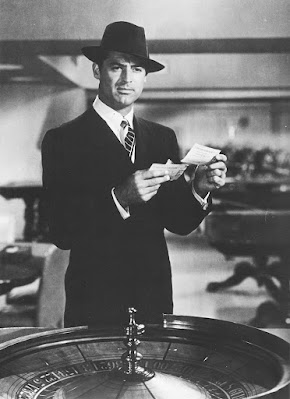Cary Grant's 62nd film was An Affair to Remember and released on today's date back in 1957.
Summary:
The suave, cosmopolitan and first-rate philanderer, Nickie Ferrante (Cary Grant), has finally decided to settle down. Sailing from Europe to New York to reunite with his lovely celebrity fiancée, Miss Lois Clarke, and her enviable inheritance, the great seducer crosses paths with the charming professional singer, Terry McKay (Deborah Kerr), who is returning to her lover. Despite both being engaged to others, the two transatlantic commuters will laugh, tease each other, and flirt--and by the time they reach New York City's Port, the clandestine couple will have fallen madly in love. Now an unforeseen and troubling dilemma burdens Nickie and Terry, only a sincere promise and a face-to-face meeting atop the iconic Empire State Building in six months' time can seal their bond. Still, is this love meant to be?
Cast:
Cary Grant...Nickie Ferrante
Deborah Kerr...Terry McKay
Richard Denning...Kenneth Bradley
Neva Patterson...Lois Clark
Cathleen Nesbitt...Grandmother Janou
Robert Q. Lewis...Self - Announcer
Charles Watts...Ned Hathaway
Fortunio Bonanova...Courbet
Did You Know?
The 53-year-old Cary Grant was only 15 years younger than Cathleen Nesbitt, who played his grandmother.
Deborah Kerr and Cary Grant improvised many of their scenes throughout filming, and a number of lines that made it to the final cut of the film came from the actors' improvisation.
Nickie and Terry make their conditional promise to meet in six months at exactly the halfway point of the film (59-1/2 minutes into the 119-minute movie).
After the confrontation with the photographer on the ship's deck, Deborah Kerr turns to Cary Grant and says, "So, I go my way [traces a straight path by her hand] and you go yours [traces a twisty path with the wave of her hand]." The same exchange takes place between Irene Dunne and Cary Grant in The Awful Truth (1937), where she says, "As we go down the life's highway, you go in your way [traces a twisty path with the wave of her hand] and I go in my way [traces a straight path]."
Deborah Kerr's character was previously played by Irene Dunne in Love Affair (1939), of which this film is a remake. Both were directed by Leo McCarey. The year before this film was made, Kerr played Anna Leonowens in The King and I (1956), also a role that had previously been played by Irene Dunne in the black-and-white classic Anna and the King of Siam (1946). "The King and I" is a musical based on the same book.
The film was shot mostly in Hollywood, though there were location shoots in New York City and the South of France. When Cathleen Nesbitt's friends asked if she had enjoyed filming her scene as Cary Grant's grandmother in France, she had to inform them that the interior scenes had been done on the 20th-Century-Fox back lot.
During filming cinematographer Milton R. Krasner pointed out to Cary Grant that a lump on his forehead was making it hard to film his close-ups. The lump was the result of a childhood accident, but Grant had been habitually rubbing it for years, leading it to swell. Doctors told him it would take four to six weeks for him to recover from its removal. Instead, he took a few days off, had his wife, Betsy Drake, hypnotize him, and had the procedure performed in the doctor's office under a local anesthetic. He recovered within days with no scarring.
To help promote the film, Cary Grant did a product endorsement, something he had tried to avoid for years. In this case, however, he was being honest. The ad was for TWA, his airline of choice.
Ingrid Bergman was the first choice to play Terry McKay. Doris Day was also considered before Deborah Kerr was cast.
This film was referenced in the movie 'Sleepless in Seattle'. Rita Wilson's character explains the story to Tom Hanks and breaks down in tears doing so.
Quotes:
Terry McKay: What makes life so difficult?
Nickie Ferrante: People?
Grandmother Janou: [talking about Nickie] Everything comes too easily to him. He's always attracted by the art he isn't practising, the place he hasn't been, the girl he hasn't met.
Interviewer: I'm sure you had some wonderful experiences in Europe.
Nickie Ferrante: Yes.
Interviewer: Would you care to expand on that statement?
Nickie Ferrante: No.
Terry McKay: My father drank beer. In the morning.
Nickie Ferrante: He was a beer drinker?
Terry McKay: Later in the day, he drank anything.
Terry McKay: We were talking about the place where I was born...
Nickie Ferrante: I can hardly wait for you to grow up.
Terry McKay: Winter must be cold for those with no warm memories... we've already missed the spring!
Lobby Cards:
Directed by Leo McCarey.
Distributed by 20th Century Fox.
Running time: 114 minutes.
Artwork by Rebekah Hawley at Studio36.


















































